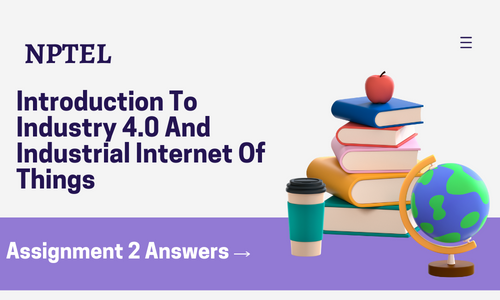Hello learners In this article we are going to discuss NPTEL Introduction To Industry 4.0 And Industrial Internet Of Things Assignment 2 Answers. All the Answers provided below to help the students as a reference, You must submit your assignment with your own knowledge and use this article as reference only.
About the course:-
Industry 4.0 concerns the transformation of industrial processes through the integration of modern technologies such as sensors, communication, and computational processing. Technologies such as Cyber Physical Systems (CPS), Internet of Things (IoT), Cloud Computing, Machine Learning, and Data Analytics are considered to be the different drivers necessary for the transformation. Industrial Internet of Things (IIoT) is an application of IoT in industries to modify the various existing industrial systems.
NPTEL Introduction To Industry 4.0 And Industrial Internet Of Things Assignment 2 Answers 2024:
1. Which of the following is a key characteristic of the Fourth Industrial Revolution?
a. Extensive use of steam engines
b. Evasion of corporate taxes
c. Widespread use of artificial intelligence
d. Introduction of assembly lines
Answer :- c
2. Which of the following is not a physical megatrend?
a. Cloud Computing
b. 3D Printer
c. Autonomous Vehicle
d. Advanced Robotics
Answer :- a
3. How does Industry 4.0 enhance sustainability in manufacturing industries?
a. By increasing manual labor
b. Through globalization and emerging technologies
c. By reducing the use of digital technologies
d. Focusing on traditional manufacturing methods
Answer :- b
4. What is a crucial aspect of Supply Chain Management (SCM) in sustainable manufacturing?
a. Prioritizing high-cost production
b. Ignoring environmental concerns
c. Outsourcing without strategic planning
d. Considering environmental concerns such as climate change, contamination, and
resource consumption
Answer :- d
5. What role does ICT play in the manufacturing industry?
a. Reducing communication within the enterprise
b. Serving as the main nervous system of any manufacturing industry
c. Discouraging the sharing of information between customer, producer, and supplier
d. Eliminating the need for enterprise resource planning
Answer :- b
6. What characterizes an emerging market in the context of Industry 4.0?
a. Markets that are fully developed and static
b. Markets that meet the standards of newly developed innovative products
c. Markets that exclusively focus on traditional products
d. Markets that resist globalization
Answer :- b
7. What is the primary focus of the Lean Production System?
a. Overworking the employees to boost production
b. Prioritizing customer needs
c. Increasing the price of products
d. Reducing technology use
Answer :- b
8. Which among the following are aspects of socio-economic issues of sustainability in Industry
4.07?
a. Social
b. Economic
c. Environmental
d. All of the above
Answer :- d
9. The Lean Production System mainly focuses on the customer’s need. Which company is
credited for the development of Lean Production System?
a. Siemens
b. Toyota Motors
c. Hitachi
d. Microsoft
Answer :- b
10. What is a major concern in implementing Lean Production in the context of Industry 4.0?
a. Reducing digital technology use
b. Integrating humans in plants
c. Ignoring customer feedback
d. Avoiding environmental considerations
Answer :- b
11. Which of the following is not a benefit of smart and connected products?
a. Decreased environmental impact
b. Better usage of product
c. Rapid increment in the sale price of a product
d. Smart Supply Chain
Answer :- c
12. Which of the following is not a fundamental building block of a smart and connected
business in the context of Industry 4.0?
a. Blueprint of profits
b. Customer values
c. Key resources and processes
d. None of the above
Answer :- d
13. What is a major advantage of smart factories?
a. Increased production costs
b. Reduced efficiency
c. Improvement in quality and safety
d. Limited product variety
Answer :-
14. How is information technology utilized in smart factories?
a. For manual data processing
b. To avoid data analysis
c. For smart software applications and to control processes
d. To limit connectivity and communication
Answer :- c
15. Communication, trust and capital with respect to the created values play an important role in
lloT business model.
a. False
b. True
Answer :- b

